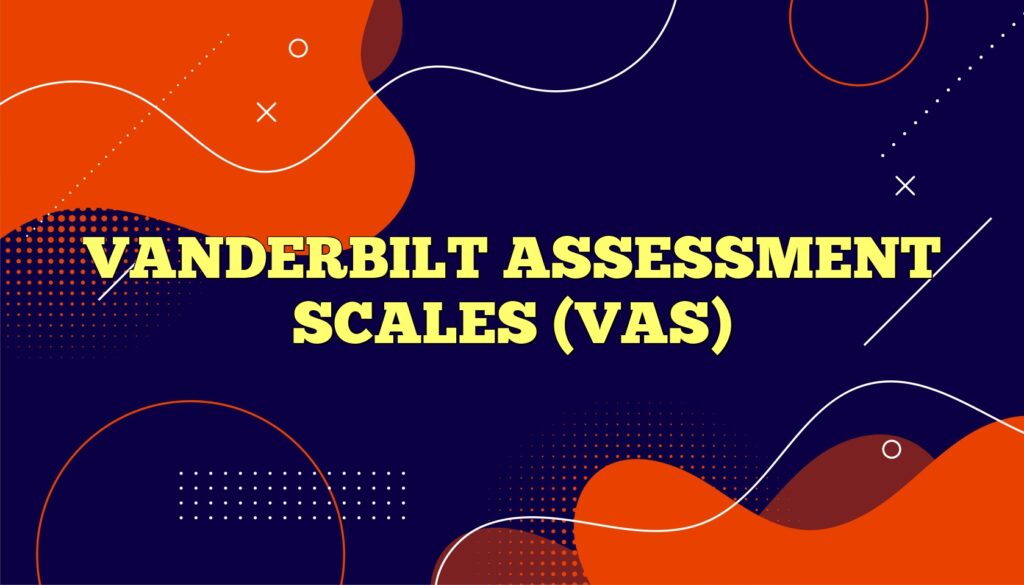Are you looking for a comprehensive guide to the Vanderbilt Questionnaire? Look no further! In this blog post, we will discuss everything you need to know about the Vanderbilt Questionnaire. We will cover its history, its uses, and how to administer it properly. Plus, we will provide you with all the information on the Vanderbilt Questionnaire itself! So read on to learn everything you need to know about this important assessment tool.
Contents
- 1 What Is Vanderbilt Questionnaire?
- 2 How Is Vanderbilt Questionnaire Administered?
- 3 What Does Vanderbilt Questionnaire Measure?
- 4 Working on Vanderbilt Questionnaire
- 5 Why Do People Use Vanderbilt Questionnaire?
- 6 Advantages of the Vanderbilt Questionnaire
- 7 Disadvantages of the Vanderbilt Questionnaire
- 8 Conclusion
What Is Vanderbilt Questionnaire?

Verbal and physical aggression is a serious problem in schools and can lead to expulsion, academic problems, and mental health issues. According to the National Center for Education Statistics, about 20% of students ages 12-18 report being bullied at school.
The Vanderbilt Questionnaire is a tool that can be used to identify children who are at risk for aggressive behavior. It is a self-report measure that asks questions about aggressive behaviors, such as hitting, kicking, and threatening others. The questionnaire also includes items about other problem behaviors, such as lying and stealing.
The Vanderbilt Questionnaire is effective in identifying children who are at risk for aggressive behavior. It is important to note that the Vanderbilt Questionnaire is not a diagnostic tool and should not be used to diagnose a child with a mental health disorder. Rather, it is a screening tool that can be used to identify children who may need further evaluation by a mental health professional.
How Is Vanderbilt Questionnaire Administered?
The Vanderbilt Questionnaire is typically administered by a trained professional, such as a school counselor or psychologist. The questionnaire can also be administered by a parent or teacher.
The questionnaire takes about 10-15 minutes to complete and can be done in person or online.
When administering the questionnaire, the individual will ask the child questions about their aggressive behaviors. The child will be asked to rate how often they engage in each behavior on a scale of 0 (never) to 3 (often).
The Vanderbilt Questionnaire can be used with children as young as 3 years old. However, it is most commonly used with children aged 6-18 years. These also are the ages for which the questionnaire has been validated.
What Does Vanderbilt Questionnaire Measure?

The Vanderbilt Questionnaire is a measure of aggressive behavior. The items on the questionnaire ask about both verbal and physical aggression. The questionnaire also includes items about other problem behaviors, such as lying and stealing. However, the focus of the Vanderbilt Questionnaire is on aggression.
The Vanderbilt Questionnaire is an effective measure of aggressive behavior in children. It has good internal consistency and reliability. Additionally, the Vanderbilt Questionnaire has good predictive validity. This means that it can accurately predict which children are at risk for future aggressive behavior.
Working on Vanderbilt Questionnaire

The Vanderbilt Questionnaire works by assessing an individual’s risk factors for developing a problem with alcohol or drugs. It is based on the premise that certain medical, psychological, and social factors can predispose someone to develop substance use disorders. The questionnaire includes questions about family history, personal history, and current drinking habits.
It is important to note that the Vanderbilt Questionnaire is not a diagnostic tool; rather, it is intended to be used as a screening tool to help identify individuals who may be at risk for developing problems with alcohol or drugs.
The Vanderbilt Questionnaire consists of three parts:
Part I assesses an individual’s medical history. It asks about any medical conditions that may increase the risk of developing problems with alcohol or drugs.
Part II is an evidence-based decision analysis tool.
It can be used to generate a quantitative estimate of the probability that a given patient has a certain condition, based on their symptoms and test results.
Part III is a cost-effectiveness analysis tool.
It can be used to compare the relative costs and benefits of different treatment options.
The Vanderbilt Questionnaire is a powerful tool that can help you make informed decisions about your health care.
Why Do People Use Vanderbilt Questionnaire?

Reasons, why people use the Vanderbilt Questionnaire, may vary, but typically, individuals turn to this assessment tool to evaluate their mental health or that of a loved one. The questionnaire is designed to screen for a variety of psychiatric disorders, including :
Depression
One of the most common disorders that the Vanderbilt Questionnaire screens for is depression. Depression is a mental health disorder characterized by persistent sadness, loss of interest in activities, and feelings of hopelessness.
The Vanderbilt Questionnaire can help to identify whether an individual is experiencing symptoms of depression and may need to seek professional help.
Anxiety
Anxiety disorders are another type of mental illness that the Vanderbilt Questionnaire can screen for. Also, Anxiety disorders are characterized by excessive worry and fear.
Individuals with anxiety disorders may experience physical symptoms such as a racing heart, sweating, and difficulty breathing. The Vanderbilt Questionnaire can help to determine whether an individual’s symptoms are due to an anxiety disorder or another condition.
PTSD
PTSD, or post-traumatic stress disorder, is a mental health disorder that can occur after someone has experienced or witnessed a traumatic event. Symptoms of PTSD include flashbacks, nightmares, and difficulty sleeping.
The Vanderbilt Questionnaire can help to identify whether an individual has PTSD and may need to seek professional help.
Substance Abuse
The Vanderbilt Questionnaire can also be used to screen for substance abuse disorders. Substance abuse disorders are characterized by the misuse of substances such as alcohol or drugs.
Individuals with substance abuse disorders may experience symptoms such as legal problems, financial difficulties, and relationship problems. The Vanderbilt Questionnaire can help to determine whether an individual’s symptoms are due to a substance abuse disorder or another condition.
Bipolar Disorder
Bipolar disorder is a mental health disorder characterized by extreme mood swings. Individuals with bipolar disorder may experience periods of mania, followed by periods of depression.
Also, the Vanderbilt Questionnaire can help to identify whether an individual has bipolar disorder and may need to seek professional help.
Advantages of the Vanderbilt Questionnaire
There are many advantages to using the Vanderbilt Questionnaire. Some of these are:
Well-Validated Tool
One of the most important advantages of the Vanderbilt Questionnaire is that it is a well-validated tool. This means that it is accurate and reliable in research studies. Sometimes, new screening tools are developed that have not yet been proven to be accurate. However, the Vanderbilt Questionnaire has been studied extensively and is considered to be a reliable tool.
Efficient
Another advantage of the Vanderbilt Questionnaire is that it is an efficient tool. This means that it can be completed quickly and easily. The questionnaire takes about 10 minutes to complete, which makes it convenient for busy individuals. Also, the questionnaire can be completed online, which makes it even more convenient.
Free
Another advantage of the Vanderbilt Questionnaire is that it is free to use. This means that anyone can access and use the tool without having to pay any fees. Also, the questionnaire is available in multiple languages, which makes it accessible to people from all over the world.
Screening Tool
Another advantage of the Vanderbilt Questionnaire is that it can be used as a screening tool. This means that it can help to identify individuals who may be at risk for developing problems with alcohol or drugs. Sometimes, people do not realize that they have a problem until it is too late. The Vanderbilt Questionnaire can help to identify individuals who are at risk so that they can get the help they need before it is too late.
Disadvantages of the Vanderbilt Questionnaire
There are some disadvantages to using the Vanderbilt Questionnaire. Some of these are:
May Not Be Accurate in All Cases
Although the Vanderbilt Questionnaire is a well-validated tool, it may not be accurate in all cases. This means that there is a chance that the questionnaire will misclassify some individuals. However, this is true for all screening tools and no tool is 100% accurate. It may be many factors that can contribute to a false positive or false negative result on the Vanderbilt Questionnaire.
Not Diagnostic
Another disadvantage of the Vanderbilt Questionnaire is that it is not diagnostic. This means that it cannot be used to diagnose a problem with alcohol or drugs. The questionnaire can only be used to screen for risk factors associated with developing problems with alcohol or drugs. If you have a positive result on the Vanderbilt Questionnaire, you will need to see a doctor or other mental health professional for a diagnosis.
Can’t Replace Professional Opinion
Another disadvantage of the Vanderbilt Questionnaire is that it cannot replace the professional opinion of a doctor or other mental health professional. The questionnaire is only a tool and should be used as part of a comprehensive assessment. A doctor or mental health professional can provide a more complete assessment and make a diagnosis.
May Miss Some People Who Are At Risk
Another disadvantage of the Vanderbilt Questionnaire is that it may miss some people who are at risk. This is because the questionnaire is not 100% accurate. However, this is true for all screening tools and no tool is perfect. If you are concerned that you or someone you know may be at risk, it is important to see a doctor or other mental health professional for a complete assessment.
Conclusion
The Vanderbilt Questionnaire is a reliable and valid measure of ADHD symptoms in children and adolescents. Researchers have found Vanderbilt to be a reliable tool for diagnosing ADHD, and it is often used in research studies. The Vanderbilt Questionnaire is also useful for tracking the severity of ADHD symptoms over time. If you are concerned that your child may have ADHD, talk to your doctor about whether the Vanderbilt Questionnaire would be a good option for you.
Also, don’t forget to take a look at our other resources on ADHD, including our list of the best books on ADHD and our guide to the best apps for kids with ADHD.
Hope this article was of help to you! If you are suffering from mental health disorders, you may seek help from Therapy Mantra. We have a team of highly trained and experienced therapists who can provide you with the tools and skills necessary for overcoming mental health disorders. Contact us today to schedule an online therapy or download our free Android or iOS app for more information.


